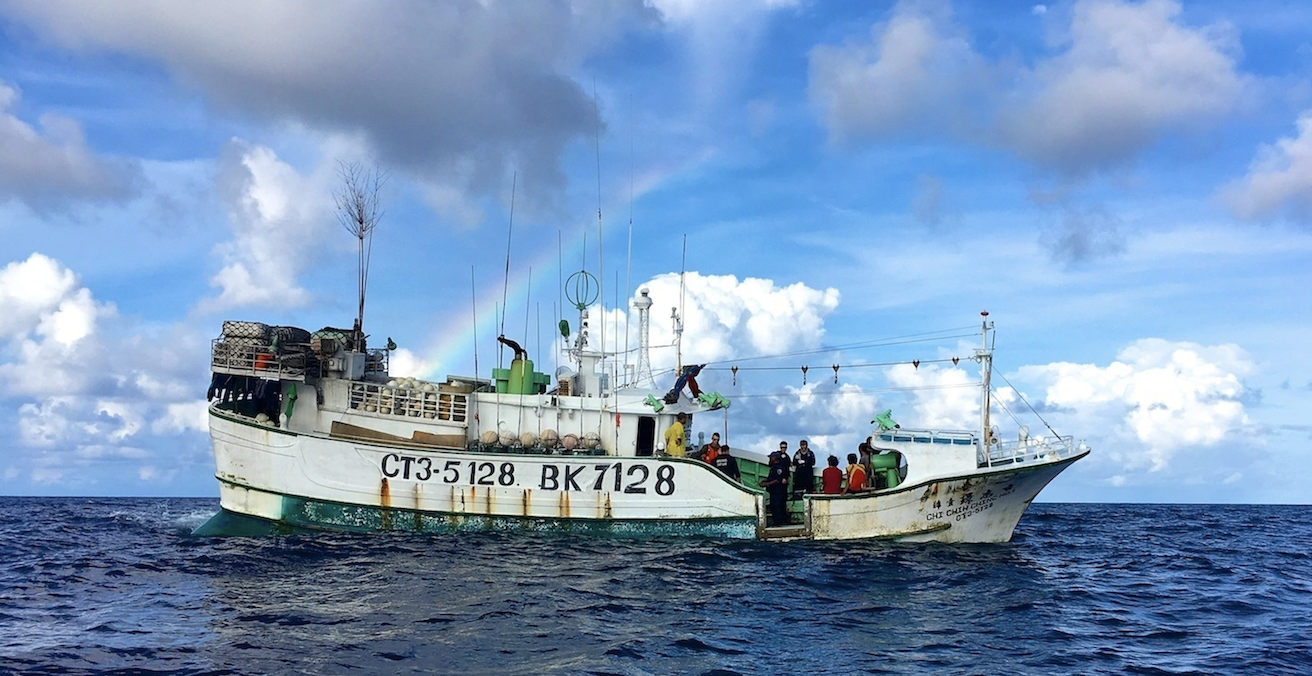Illegal Fishing and Australian Security

Illegal fishing is increasingly recognised as an ecological catastrophe. However, framing it as a resource-based issue ignores the full range of security challenges that illegal fishing poses for Australia.
This article was originally published on Australian Outlook on 27 February 2019.
The security impact of illegal fishing is not well understood. Where illegal fishing is recognised as a security problem, the focus has been on fish as a natural resource, the depletion of which can have impacts on food security, individual livelihoods and the economic survival of states relying on illegal fishing. A focus on fish as a natural resource obscures the other security challenges the crime of illegal fishing poses to Australia. Illegal fishing overlaps with drug, human, weapon and other contraband trafficking and smuggling; irregular maritime arrivals; and maritime piracy. In addition, like other easily transported, high-value resources, illegal fish can fund insurgencies and other types of political violence. Understanding illegal fishing as a security challenge will improve Australia’s national security policy.
Illegal fishing poses security challenges as a threat to a scarce natural resource
Illegal fishing presents a serious challenge to a declining natural resource. Global fisheries are in a precarious state. The Food and Agriculture Organization estimates more than 58 percent of global fish stocks are fully exploited, after 40 years of continuous decline. To put this in perspective, the loss of a single species can trigger catastrophic damage, as the balance is disturbed with resulting effects on dependent species and sometimes whole ecosystems. Where a fishery becomes completely depleted it may take many decades to recover, or may never do so. Climate change has a particularly dangerous impact on fisheries, as species numbers and ranges are likely to change with increasing sea temperature, acidification and more extreme weather events.
Illegal fishing further burdens precarious marine resources, already stressed by decades of industrial fishing, marine pollution and habitat destruction. These ecological impacts of fishing are already being felt in the Indo-Pacific.
Illegal fishing poses security threats through linkage to maritime crimes
Illegal fishing vessels are implicated in various crimes that pose a threat to Australia’s security. Fishing vessels are suitably “disguised” in the seascape and even upon boarding a vessel, law enforcement may face difficulty ascertaining whether crew are engaged in illegal activity. Many fishing vessels are not legally required to be registered and therefore not subject to the same oversight as larger vessels. There are considerable links between vessels fishing illegally, and fishing vessels engaging in other criminal behaviours. Commentators have argued the importance of broadening the view of the potential links between illegal fishing and other maritime crimes, including document fraud, customs and tax evasions, human trafficking, drug trafficking, money laundering and insurance fraud. Crime, like any other type of big business, requires diversification to be sustainable. Those already engaged in crime will willingly expand their operations into other crimes to support their ventures. The links between illegal fishing and other types of organised crime with a maritime dimension. Illegal fishing vessels are involved in crimes that have serious national security implications, including maritime piracy, trafficking and smuggling, forced labour and irregular maritime arrivals.
There are demonstrated links between scarce fish resources and the growth of piracy in Malaysia, Indonesia and the Philippines. Decreasing fish resources are associated with increased crime and violence, including smuggling, trafficking, and piracy. While piracy in this area has not received as much attention in recent years, there is little doubt that piracy and its links with oil theft and other crimes pose challenges for this region.
Illegal fishing vessels are an ideal transport mechanism for all types of trafficking and smuggling. Small- to medium- fishing vessels are especially useful because they are common in Australia’s regional waters and therefore hard to distinguish from legal vessels. Links between illegal fishing and the movement of drugs across borders are well established; drugs are often smuggled aboard vessels in frozen storage. Illegal fishing vessels have been used as motherships for the transshipment of drugs between vessels and to refuel smuggling vessels. Fishers often resort to these crimes when they are unable to meet their livelihood through fishing, and so turn to activities such as small arms trafficking
People smuggling and trafficking are common in the fishing industry in two ways. First, illegal migrants may pay exorbitant fees to be inconspicuously transported aboard a fishing vessel to another location. Second, people are trafficked to work aboard illegal fishing vessels. The growing demand for fish, declining catches and rising costs of fishing have combined causing exploitation of migrant workers in response to these economic challenges.
In the Australian context, fishing vessels pose an additional security threat as they are linked to refugee arrivals by sea. The creation of Operation Sovereign Borders in 2013, with the purpose of combating maritime people smuggling, clearly links migration with security. Operation Sovereign Borders, led by the Australian Defence Force is supported by the Australian Border Force and the Australian Federal Police. Australia’s policies on migration are often cited as a classic example of securitisation, where a political problem is treated as a security challenge in order to facilitate emergency politics and the suspension of ordinary rules. Australia’s use of the military to control migration by sea demonstrates the degree to which the issue has been elevated to a security problem.
In the future, illegal fishing could pose another challenge to Australian security through a potential nexus with insurgency and terrorism. Terrorist and insurgent groups rely on crime to fund their activities. One particularly effective way to raise funds is to engage in the illicit acquisition, receipt or smuggling of high value, easily accessible and sellable commodities. Fish are precisely the sort of high value and marketable goods that can be easily smuggled and therefore effectively used to fund terrorist and insurgent groups.
Legal frameworks for controlling illegal fishing
The international community has made significant efforts to establish legal frameworks and institutions, standards and programs to ensure both the sustainable utilisation of fish stocks and reduction of illegal fishing over the last four decades. There is no single binding international treaty that covers all fish, nor one institution mandated to address fisheries crime. This has created a complex regulatory regime with some gaps and overlaps. The UN Convention on the Law of Sea establishes maritime zones permitting various types of behaviour. Within territorial seas and exclusive economic zones, states have control over resources. On the high seas, no one state is sovereign and fisheries tend to be managed through regional fishing management organisations comprised of littoral states and states that fish in that their waters.
The ability of these instruments to reduce illegal fishing is mixed. States have been “low and slow” in their uptake and implementation of international legal instruments designed to control illegal fishing, and so enforcement is patchy. It is very hard to enforce illegal fishing without the participation of a wide number of states because the regime can be so easily undermined by non-participation.
Focusing on the criminal threat posed by illegal fishing reveals the inadequacies of the legal and institutional frameworks designed to control it. These instruments create a rough patchwork of control designed to protect fish as an important natural resource. However, patchworks are by nature full of gaps, and criminals are especially good at exploiting gaps in regulation.
Focusing on criminal security threats has important policy benefits
A focus on illegal fishing as a crime with significant security implications is important. The current approach, which focuses on protecting the natural resource of fish from illegal extraction, has not solved the problem. An effective solution requires reconceiving illegal fishing as not just as an economic and environmental resource issue but as a facilitator of broader maritime crime. This change in focus yields two immediate benefits: first, it highlights deficiencies in the legal regime applied to illegal fishing. Focusing on the crime of illegal fishing reveals that much of the law that might be applied to the problem is not designed for enforcement. Second, focusing on the criminal-security implications demonstrates inconsistent enforcement efforts in Australia’s maritime regions. Additionally, a focus on criminal enforcement demonstrates that novel, occasionally almost entirely left-field approaches, might be necessary to bring illegal fishing and its negative security impacts under control.
Longer-term benefits of a security approach to illegal fishing
Illegal fishing creates many security challenges for Australia, in particular, because of its links to transnational organised crime. Countering illegal fishing, however, creates opportunities for Australia to enhance its responses to this problem and other maritime security issues. If Australia is seeking to work with new allies or cement existing relationships both inside and outside the region, countering illegal fishing provides an excellent starting point. Given that Australia is already operating in areas where cooperation on illegal fishing would be necessary, adding more international cooperation would be particularly low cost. Illegal fishing may occur in different regions, but it is the same threat, often perpetrated by the same actors, and needs a truly Indo-Pacific approach.
Dr Jade Lindley is a criminologist at The University of Western Australia Law School and Oceans Institute, specialising in transnational organised crime, particularly in the maritime space.
Dr Sarah Percy is associate professor of International Relations at the University of Queensland. She has published widely on piracy, counter-piracy and maritime crime.
Dr Erika Techera is a professor of law at The University of Western Australia. She is a member of the UWA Public Policy Institute and UWA Oceans Institute. Erika’s research focuses on international and comparative environmental law, and particularly issues related to oceans governance.
This is an extract from an article by Lindley, Percy and Techera in Volume 73, Issue 1 of the Australian Journal of International Affairs titled “Illegal fishing and Australian security.” It is republished with permission.





